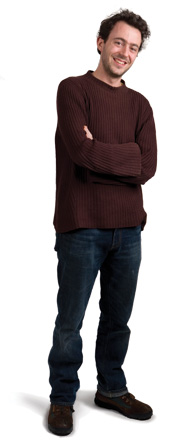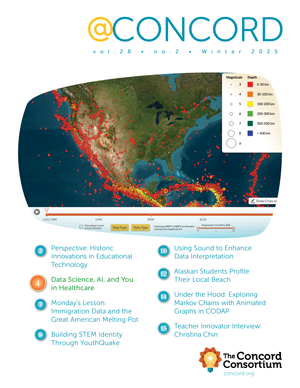Innovator Interview: Sam Fentress
 Q. Tell us about your background.
Q. Tell us about your background.
A. I was born in Rome to American parents and grew up there. I attended an English international school based on the British A-level system and came to the States to study liberal arts at Wesleyan, where I created my own major in cognitive science.
I did a Master’s in Artificial Intelligence in Edinburgh and worked on a genetic algorithm using a theory of evolution that hadn’t been applied before. It was based on Gould’s theories of “exaptation”—a mechanism by which traits that were evolved for one purpose could be co-opted for another use. I was able to apply this to several known hard problems in evolutionary algorithm, with very good results. One of the exciting things about that has been seeing a sudden slew of articles in computer science journals in the past few years using this technique and citing my work.
I then found myself in Cambridge [MA], working at a language lab as a research assistant. I wrote a new, open-source Java program to present the language tests. Other people have continued to make improvements to it, which is great.
Q. Do you go back to Italy frequently?
A. My parents are still in Italy, and my family gets together in Tuscany most summers. We spend the morning deciding what to have for lunch, making it, then eating for three hours. We spend the afternoon deciding what to have for dinner, which lasts until midnight. A lot of wine is drunk.
Q. Did you travel when you were growing up?
A. We went everywhere—throughout the Mediterranean, North Africa, Eastern Europe. I worked on an archeological dig in Tunisia with my mother for several summers, which was fun. We found Roman cities centered on the production of murex, a seashell that you can crush to create purple dye for togas.
Q. How did you learn about the Concord Consortium?
A. The Concord Consortium was the only place creating interesting, open-source models and teaching interesting science. It is mission driven. Everyone is interested in helping students visualize science in ways they haven’t before. I think a programmer is happier if they believe in what they’re coding.
Q. What are some interesting things you’ve worked on?
A. I’ve worked on three evolution or genetics programs, two with dragons, which is great because I get to tell people I’m working with fire-breathing dragons. I also work on a project for teaching electronics, and can see the SPARKS product being widely disseminated because it’s a nice, simple program to teach quite complicated concepts. And I’ve been working on Next-Generation Molecular Workbench, which has been engaging because I’ve had to learn new physics to program it.
Q. Why open source?
A. It’s fun to discover a great library and to collaborate on code, working to create something cool and useful. We’ve had experiences of people making comments on our code and submitting patches without being asked. We try to give back and submit patches, too. That dialogue between developers pushes us all to make better stuff.
Q. What do you like to do outside of work?
A. Coding all day makes me want to build with my hands. I’ve tinkered with Arduinos and designed simple toys. I’ve also spent time at Artisan’s Asylum, a local makerspace, welding and making wooden furniture. And I probably spend an hour or two cooking every night.
